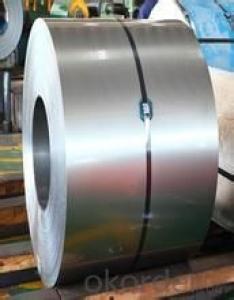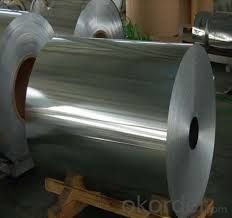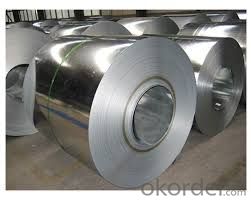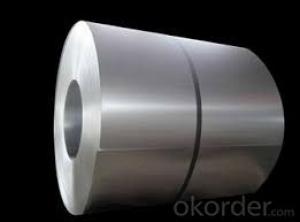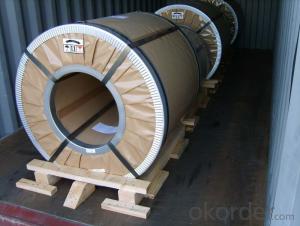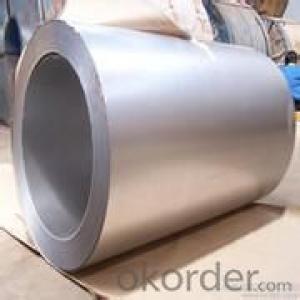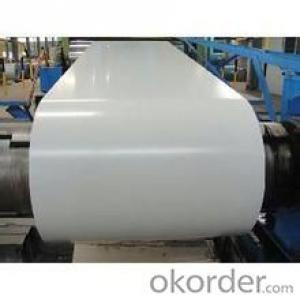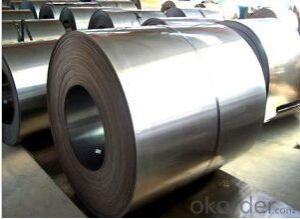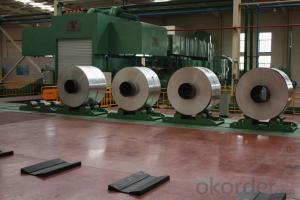excellent Cold rolled steel coil -SPCC in good quality
- Loading Port:
- China main port
- Payment Terms:
- TT OR LC
- Min Order Qty:
- 30 m.t.
- Supply Capability:
- 5000000 m.t./month
OKorder Service Pledge
OKorder Financial Service
You Might Also Like
Specification:
Product Name | Cold Rolled Sheet Coil |
Material | SPCC/SPCD/SPCE/DC01/ST12/ ST14/SPCD/DC03/DC04 ect. |
Grade Standard | JIS G3302, EN10142, ASTM653, ASTM95 |
Thickness | 0.15-3.5mm |
Width | 600mm-1500mm |
Coil ID | 508-610mm |
Coil OD | max 1500mm |
Weight | 3-10 Tons |
Tolerance | Thickness tolerance:+/-0.02mm; Width tolerance:+/-5mm |
Surface | No-skin passed or Skin passed, Tensile leveled |
Surface Treatment | Chromate/Unchromate passivation, fingerprint resistant treatment, oiled/unoiled |
Annual Output | 350,000MT |
Application | Construction, hardware, home applicances, interior decoration |
Main Features:
1. Commercial quality suitable for bending fabrication and simple forming; this is the type in greatest demand.
2. Drawing quality second only to that of SPCEN. Excellent uniformity.
3. Deep-drawing quality.With metallurgically controlled grain size, it retains its beautiful finish even after being deep-drawn.
4. Extra-low-carbon steel sheets with highest workability
Images:
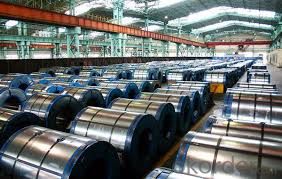
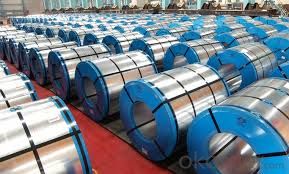
Quality of the goods could be guaranteed. The finished product has a variety of excellent capabilities, such as continuous rolling, degreasing, annealing, skin pass, slitting and cut to length line etc. Along with it many rocessing capability and smooth, flat surface. It’s widely used in outdoor and interior decoration, furnishing
- Q: - I'm considering doing my physics coursework on the uses of Mild Steel in skyscrapers and construction, would this be right? Some sources tell me mild steel is too weak, others say it is fine
- Mild steel doesn't really mean anything, technically. In today's world all steel is mild steel unless it's high carbon or alloy, which are mostly tool steels. You'll need to study steel much deeper than that to accomplish any real physics work relating to steel.
- Q: How are steel coils uncoiled?
- Steel coils are typically uncoiled using a mechanical device called a decoiler. The decoiler feeds the steel coil through a set of rollers, which gradually unwinds and straightens the coil, allowing it to be used for various applications.
- Q: What are the common uses of coated steel coils?
- Coated steel coils are commonly used in various industries such as construction, automotive, appliances, and electronics. They serve multiple purposes including structural support, corrosion resistance, aesthetic appeal, and durability. These coils are extensively used for manufacturing roofing materials, siding, gutters, HVAC systems, automotive body parts, and electrical enclosures, among many other applications.
- Q: How do steel coils contribute to the agricultural industry?
- Steel coils play a vital role in the agricultural industry by serving as a key component in the production and maintenance of various agricultural machinery and equipment. These coils are primarily used in the manufacturing of farm equipment such as tractors, plows, harvesters, and irrigation systems. One of the significant contributions of steel coils is their durability and strength, making them ideal for agricultural applications. The coils are processed and formed into different shapes and sizes to create sturdy components that can withstand the harsh conditions and heavy workloads typically associated with farming operations. Steel coils are widely used in the construction of tractor frames, ensuring the structural integrity and stability of the vehicles. The coils are also utilized in the manufacturing of plow blades, providing the necessary strength to effectively cut through the soil and prepare the land for planting. Moreover, steel coils are crucial in the creation of harvester blades, enabling efficient harvesting and minimizing crop damage. In addition to machinery, steel coils are essential in the production of irrigation systems that are instrumental in agricultural practices. These systems require pipes and tubes that can withstand high water pressures and resist corrosion caused by the elements. Steel coils are processed into these pipes and tubes, ensuring their durability and longevity, thereby aiding in efficient water management and irrigation in fields. Furthermore, steel coils contribute to the agricultural industry by ensuring the safe storage and transportation of agricultural products. They are used in the construction of storage silos and grain bins, which provide secure and weather-resistant spaces for storing crops. Steel coils are also utilized in the fabrication of transportation containers such as trailers and trucks, ensuring the safe delivery of agricultural goods from farms to markets. In summary, steel coils have a significant impact on the agricultural industry. Their strength, durability, and versatility make them essential in the manufacturing of agricultural machinery, irrigation systems, storage facilities, and transportation containers. By providing reliable and efficient equipment, steel coils contribute to increased productivity, improved crop yields, and enhanced overall efficiency in the agricultural sector.
- Q: So...that means Wolverine can stab him, right? Because Adamantite is stronger than steel. Correct?
- Not really, it's just a nickname. Wolverine couldn't stab Superman.
- Q: What are the different types of steel coil surface treatments for outdoor applications?
- For outdoor applications, there are several commonly used surface treatments for steel coils that enhance durability, corrosion resistance, and appearance. Examples of these treatments include: 1. Galvanized: This treatment involves applying a layer of zinc to the steel surface, providing excellent corrosion resistance. Galvanized steel coils have a shiny, silver appearance. 2. Galvalume: Galvalume is a combination of aluminum and zinc applied to the steel surface, offering superior corrosion resistance compared to galvanized steel. Galvalume steel coils have a duller, matte finish. 3. Painted: Steel coils can be painted with various coatings to enhance appearance and protect against corrosion. The paint can be applied in single or multiple layers, depending on the desired level of protection. Painted steel coils are available in a wide range of colors and finishes. 4. Powder Coated: This type of paint coating is applied as a powder and then cured under heat, resulting in a durable and long-lasting finish. Powder coated steel coils are resistant to chipping, scratching, and fading, making them suitable for outdoor applications. 5. Organic Coated: Organic coatings, such as PVC or PVDF, are applied to steel coils to provide additional protection against corrosion and weathering. These coatings are commonly used in architectural applications where aesthetics and durability are important. These various surface treatments for steel coils offer different levels of protection and aesthetic options for outdoor applications. The choice of treatment depends on factors such as the intended use, environmental conditions, and desired appearance.
- Q: How are steel coils used in the production of automotive frames?
- Steel coils are used in the production of automotive frames as they provide the necessary strength and durability. These coils are typically formed into specific shapes and sizes, which are then welded together to create the frame structure. The high tensile strength of steel coils ensures that the automotive frame can withstand the various stresses and strains experienced during vehicle operation, ensuring safety and stability.
- Q: How long does the coating on steel coils last?
- The lifespan of the coating on steel coils can vary depending on various factors such as the type of coating, environmental conditions, and maintenance. However, on average, a well-maintained coating on steel coils can last anywhere from 10 to 30 years.
- Q: Which is used for what?Differences as far as style etc.???Better in your opinion and why??I'm just beginning to look at guitars i might be able to get at christmas if i'm still committed..i've been looking online.,,,,NYLON or STEEL STRINGED ACOUSTIC GUITAR????Thanks.
- u can play any type o music with steel stringed guitar.. but with nylon string ,guitarist usually pick the strings with finger nails,coz its will be hard to hit that with guitar picks coz there will be a chance of string popping nylon string gutiars are used for classical guitar playing... the tone is somehow sweeter on nylon.. but its up to you according to your music style
- Q: How are steel coils inspected for surface defects using non-destructive testing methods?
- Steel coils are inspected for surface defects using non-destructive testing methods such as visual inspection, magnetic particle inspection, and eddy current testing. Visual inspection involves closely examining the coil's surface for any visible defects or abnormalities. Magnetic particle inspection is used to detect surface cracks and defects by applying a magnetic field and then applying iron particles that reveal any magnetic leakage caused by defects. Eddy current testing is employed to detect surface cracks and defects by inducing an alternating current in a coil that creates a magnetic field, and any changes in the field caused by defects are detected. These non-destructive testing methods help ensure the quality and integrity of steel coils without causing any damage.
Send your message to us
excellent Cold rolled steel coil -SPCC in good quality
- Loading Port:
- China main port
- Payment Terms:
- TT OR LC
- Min Order Qty:
- 30 m.t.
- Supply Capability:
- 5000000 m.t./month
OKorder Service Pledge
OKorder Financial Service
Similar products
Hot products
Hot Searches
Related keywords
